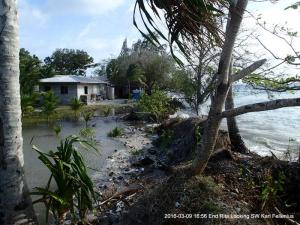Symposium on climate displacement, migration and relocation to be held in Honolulu in December
University of Hawaiʻi at MānoaResidents in Hawai‘i, Alaska and the Pacific Islands are on the front lines of the impacts of climate change, and moving to a safer location is one of many adaptation responses that communities are considering. A symposium in Honolulu this December aims to address legal and policy challenges and questions surrounding climate displacement and relocation.
The effects of climate change, especially storms and sea-level rise, pose a grave and immediate threat to many communities in the Pacific. For some, relocation will ultimately be the only sustainable choice. The “Symposium on Climate Displacement, Migration and Relocation,” hosted by the White House Council on Environmental Quality, NOAA Office for Coastal Management, the Environmental Law Program of the University of Hawaiʻi William S. Richardson School of Law, the Alaska and Hawaiʻi Sea Grant College Programs, and the Pacific Islands Climate Science Center will address questions about migration and relocation for communities in the continental U.S. and Pacific Islands.
The symposium, to be held December 13-14, 2016, in Honolulu, is one component of major new funding and programs announced in early September by the U.S. Administration to address the critical need to build climate resilience.
As the climate changes, warming temperatures, increases in the frequency and intensity of extreme weather events, and coastal inundation have the potential to severely impact coastal communities worldwide. As the impacts of climate change become more pronounced, it is likely that more families will consider relocation.
At the local and national levels, Sea Grant is working to help communities stay in their homes by developing strategies to promote human health, livelihoods and economic development while building community resilience. However, in some cases, communities have made the decision that the only option is to move to safer ground.
The symposium will provide a platform for stakeholders, researchers, policy experts, indigenous leaders and local, state and federal government officials to explore legal and policy opportunities and challenges. It will address questions about how to plan for and implement voluntary migration and community-led relocation as adaptation strategies, both domestically and in the context of the Pacific Islands.
A call for papers has been issued for abstracts on international and domestic law and policy and crosscutting questions. The symposium committee welcomes work from legal scholars and practitioners from around the world. The deadline for submission is Monday, October 10, 2016.
For more information, please visit the Symposium on Climate Displacement, Migration, and Relocation web page.
Also on the web: Obama Administration Announces New Policies to Promote Conservation and Build Resilience to Climate Change, with a focus on Pacific Islands.
The University of Hawai‘i Sea Grant College Program is part of the University of Hawai‘i at Mānoa’s prestigious School of Ocean and Earth Science and Technology. It supports an innovative program of research, education and extension services directed to the improved understanding and stewardship of coastal and marine resources of the state, region and nation. Science serving Hawai‘i and the Pacific since 1968.
For more information, visit: https://seagrant.uaf.edu/conferences/2016/climate-migration/

